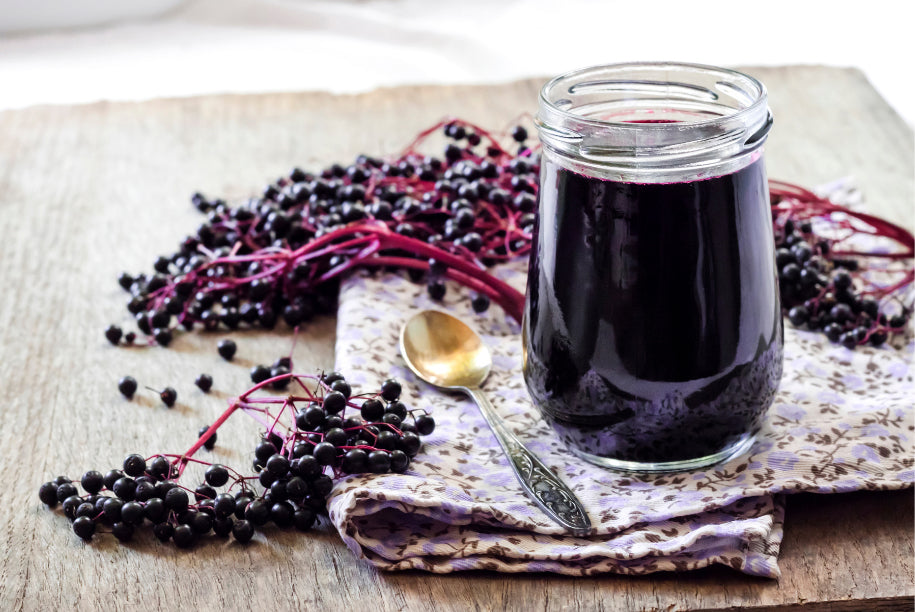It’s the time of year when a sniffly nose is commonplace, and many of us take extra herbs, vitamins and supplements to avoid catching a cold or flu from loved ones.
One of our favorite ways to support our bodies during cold and flu season is with elderberry syrup. While we do sell Elder Berry Syrup full of herbs, it’s pretty fun to make a simple elderberry syrup at home if you’re in a pinch or looking for another way to support your health naturally.
Today, we’re sharing a DIY recipe for making elderberry syrup at home and a handful of the fantastic research studies we found about elderberry’s purported health benefits — which (of course) includes immune-boosting claims as well as research that suggests elderberries are good for your heart health, overall wellness, and reducing inflammation.
Supports The Body During Cold and Flu Season
The most popular claim about elderberries is that they’re ideal for supporting yourself while you’re sick or giving you a boost to avoid getting sick in the first place.
According to Mount Sinai, elderberry may reduce congestion and help you sweat more, which may help you heal from cold and flu symptoms faster. Researchers even suggest that some elderberry extracts may shorten the duration of the flu by around three days, which may be due to the vitamin C content or the flavonoids in elderberry (or both!).
In addition to its many natural antioxidant properties and high vitamin C content, elderberries have long been used as an antiviral in Europe. Per the University of Rochester Medical Center, the flavonoid content is antiviral and may support your body during the common cold.
The National Center for Complementary and Integrative Health reports that some preliminary research suggests elderberries may reduce flu, cold, and upper respiratory symptoms. However, it’s always important to speak with your health provider before taking a new herbal product.
Lastly, a 2017 study reviewed the antiviral properties of black elderberries and reported that antiviral and antimicrobial properties have been found in elderberry extracts, which may be particularly helpful in the treatment of influenza.
Learn more about immune system-boosting herbs in our previous article on astragalus and echinacea.
Encourages Better Heart Health and Wellness
Elderberries are rich in anthocyanins, a flavonoid praised for its potential ability to enhance memory, lower blood pressure, prevent neurological disease, and even slow cancer growth.
We found the following studies about elderberries and its flavonoids very encouraging!
- Elderberries promote a decreased risk of cardiovascular disease. Dietary flavonoid intake has been shown to decrease cardiovascular disease risk significantly.
- Elderberries may support healthy cholesterol levels. A 2015 study found that anthocyanin-rich black elderberry extract reduced aortic cholesterol in animals, which is a risk factor for atherosclerosis (commonly referred to as “hardening of the arteries,” which may lead to blood clots).
- May encourage diabetes and obesity prevention. One study found anthocyanins may help prevent diabetes and obesity, which can contribute to heart problems. This same study also shared that anthocyanins may protect against cardiovascular disease due to their role in oxidative stress protection.
- Provides critical antioxidant activity in the body. Elderberries are rich in polyphenols and may have beneficial effects on blood pressure and antioxidant enzymes in the blood plasma. As a result, they may reduce uric acid, which has been associated with hypertension in high concentrations.
- Elderberry may have anti-diabetic and heart-healthy effects. A study found that anthocyanins were helpful in diabetic animal studies in maintaining a healthy atherogenic index range (a key marker that measures the risk of cardiovascular disease).
Interested in learning more about herbs that encourage better heart health? Read our previous article on garlic, which has impressive research on its benefits for heart health, cholesterol, immunity, and more.
May Reduce Inflammation and Oxidative Tissue Damage
Flavonoid components from fruits and vegetables may affect oxidative cellular damage (the process of cell damage in our body that can lead to undesirable health conditions).
Elderberries are rich in flavonoids, specifically anthocyanins — a compound that gives many fruits and vegetables gorgeous color. Several studies have concluded that natural anthocyanins may protect us against chronic degenerative diseases.
In 2023, researchers reviewed elderberry extract’s impact on various health conditions and found that its polyphenols and high antioxidant content contributed to its supportive anti-inflammatory benefits. On top of that, the authors reported that elderberry may have anti-diabetic, anticancer, antiviral, and immuno-stimulatory effects.
The 2023 study concluded that those who consume large amounts of polyphenol-rich fruits and vegetables, like elderberry, may protect against health disorders prompted by oxidative stress, such as cardiovascular disease, inflammation, autoimmune diseases, and diabetes.
Lastly, some animal studies have found that it may produce anti-depressive benefits. The research group given elderberry extract “showed remarkable antidepressant activity.”
How to Make Elderberry Syrup for Wellness
Discover how to make your own elderberry syrup at home — a delicious and natural way to support your body, especially during cold and flu seasons!
Ingredients You'll Need:
- 5 oz (1 jar) Very Berry Elder Berry Tea (or substitute with elderberries)
- 1 cinnamon stick
- 15 small cloves (approximately 1 tsp)
- 1 sprig thyme (approximately 1/2 tsp fresh or dried)
- 48 oz filtered or spring water
- 12 oz raw honey
Optional Supportive Additions:
Osha Root, Echinacea Root, Astragalus Root, Wild Cherry Bark
Optional Additions for Flavor:
Orange Peel, Vanilla Extract
Helpful Tips:
- Store your syrup in the fridge for up to a month.
- Want it to last even longer? Add brandy as a natural preservative (note: not suitable for children).
- Honey isn’t safe for children under 1 year old.
Find all the ingredients you need here: Make Your Own Elderberry Syrup.
I hope this article inspires you to try elderberries. From immune-boosting effects to being a good source of flavonoids, these berries are rich in supportive components.
Well Wishes,
Herbalist Natalie
 |
Natalie Hajdu-Voakes is a consulting Herbalist with over 27 years of hands-on experience and the owner of The Herb Stop. |

